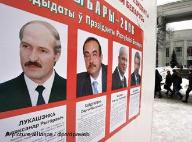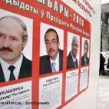
Belarusians Elect Their House of Representatives
Publication: Eurasia Daily Monitor Volume: 13 Issue: 146
By:

Belarus held parliamentary elections on Sunday, September 11. Two opposition-minded candidates have been elected to the Belarusian legislature’s lower chamber, the House of Representatives: Anna Konopatskaya from the United Civic Party (headed by Anatol Lebedko, a long-time opposition politician) and Elena Anisim, deputy chairperson of the Comradeship for the Belarusian Language (headed by Aleh Trusau, yet another ever-present face in post-Soviet Belarusian politics). Konopatskaya is a lawyer by training and an independent entrepreneur. Anisim is a linguist from the Belarusian Academy of Science. Interestingly enough, Konopatskaya, who ran for a precinct in Minsk, defeated four other candidates, including Tatyana Korotkevich from the “Speak the Truth” campaign, an opposition candidate with the highest level of recognition as she ran for president in 2015. Anisim also had presidential ambitions, but in 2015 she decided not to run. Almost 75 percent of the electorate cast their ballots, including 31 percent who voted early (Tut.by, September 12). The early vote was allowed from September 6. As it is now warm in Belarus, many people chose to spend Sunday, election day, at their country houses and resorted to early voting. The electoral outcome is contrary to some predictions made under the assumption that Belarusians “always” vote for the people connected with the executive branch, not for outsiders. But it remains to be seen whether the Organization for Security and Cooperation in Europe (OSCE) and the European Union will endorse the Belarusian elections. After all, some but not all the recommendations of the OSCE’s Office on Democratic Institutions and Human Rights (ODIHR) regarding electoral procedures were implemented by Belarus’s Electoral Commission (see EDM, May 6).
On many occasions, EU representatives stated that they would pay close attention to these elections as a touchstone for their Belarus policy; on September 7, a similar statement was made by the Embassy of the United States to Belarus (Tut.by, September 8). For most observers, such statements reflect an unequivocal willingness of Western decision-makers to retain regular contacts and further develop smooth, if not outright friendly, relationships with Minsk. This impression is strong, largely unanimous and attributed to three factors:
First, the EU’s decisions to suspend its sanctions on Belarus (as was the case in October 2008 and October 2015) or to practically lift them altogether (as in February 2016) are routinely driven by geopolitical circumstances, like the Russian-Georgian war of 2008 and the ongoing conflict between Russia and Ukraine, not fundamental political changes inside Belarus. The aforementioned geopolitical circumstances make Belarus’s independence more important in the eyes of the West than achieving the goals pertaining to democracy promotion.
Second, in the political system that took shape in Belarus in the wake of the 1996 constitutional crisis, the parliament is not influential to begin with. Suffice it to say, the previous convocation of the parliament only initiated adoption of three bills, whereas all the remaining bills (altogether about 400) were directed to the parliament by the presidential administration. Not a single bill was rejected and at least 95 percent of the members of parliament voted yes for each of the adopted bills (Carnegie.ru, September 6).
Third, regardless of the fixation of some Western critics on Belarus’s political order, this country is just one of many that imitate Western political forms. It is hardly surprising that Belarus ended up coloring these forms with its homegrown political culture. Rather, this should have been expected. After all, Russia, many post-Soviet states, and numerous other countries outside Western Europe and North America have done the same. The late Russian political scientist, Dmitry Furman even published a theoretical manifesto summarizing precisely such an experience, a text pointedly titled The Apology of Imitation (Nezavisimaya Gazeta, April 6, 2007). One should not, therefore, take the diplomatic ritual dances too seriously—particularly given the West’s interest in Belarus being able to retain its statehood.
In the meantime, Minsk has been taking steps to meet the West halfway. Some procedural electoral changes have already been implemented. Moreover, officials and pundits both close to the government and to the opposition have been making curious statements. For example, Foreign Minister Vladimir Makei went to Kyiv and thanked President Petro Poroshenko of Ukraine for his facilitation of Minsk’s rapprochement with the West (Naviny.by, August 26). Senator (a member of the parliament’s upper chamber) Igor Marzalyuk, who was running to become a member of the lower chamber and was elected, stated during the electoral meeting in the city of Mogilev that by annexing Crimea “Russia did a horrible thing. What existed at the level of mass consciousness—a feeling of belonging to a common whole, East Slavic unity—was destroyed during one day.” He subsequently launched into a diatribe against Ukrainian politicians like former premier Arseniy Yatseniuk and Olexander Turchynov, asserting they “should rot behind bars, not occupy high positions,” because they did not defend Ukraine’s territorial integrity in early 2014 (Naviny.by, August 30). In addition, two political commentators close to the government in Minsk, Arseniy Sivitski and Andrei Tsarik, coauthored a policy brief highly critical of Russia’s attempts to involve Belarus in its confrontation with the North Atlantic Treaty Organization (NATO) (Csfps.by, August 19). Some Russian media outlets published angry rebukes in response (for example, EaDaily, August 31). Furthermore, during a talk show on the Belarusian service of Radio Liberty of all places, the opposition-minded analyst Siarhei Bahdan claimed that “actually, the authoritarian model of power [in Belarus] allowed, in a sense, to build and retain Belarusian statehood.” Absent authoritarianism, Bahdan does not envision the possibility of popular mobilization in Belarus for the sake of independence. His interlocutor, a reputable scholar of Belarusian nationalism, Valer Bulgakau, opined that in the 1990s, Belarusian society was not ready for democracy and that the absence of a single blueprint of Belarusian nationalism would have led to bitter arguments that President Alyaksandr Lukashenka’s rule put an end to. He concluded that the potential exit of Lukashenka from the helm of power may open the door to chaos (Svaboda.org, August 27).
In summary, while there is an established, if somewhat snobbish, tradition to label Belarus’s political life boring, Belarus-watchers are anything but bored at the moment. And even more excitement is expected.




